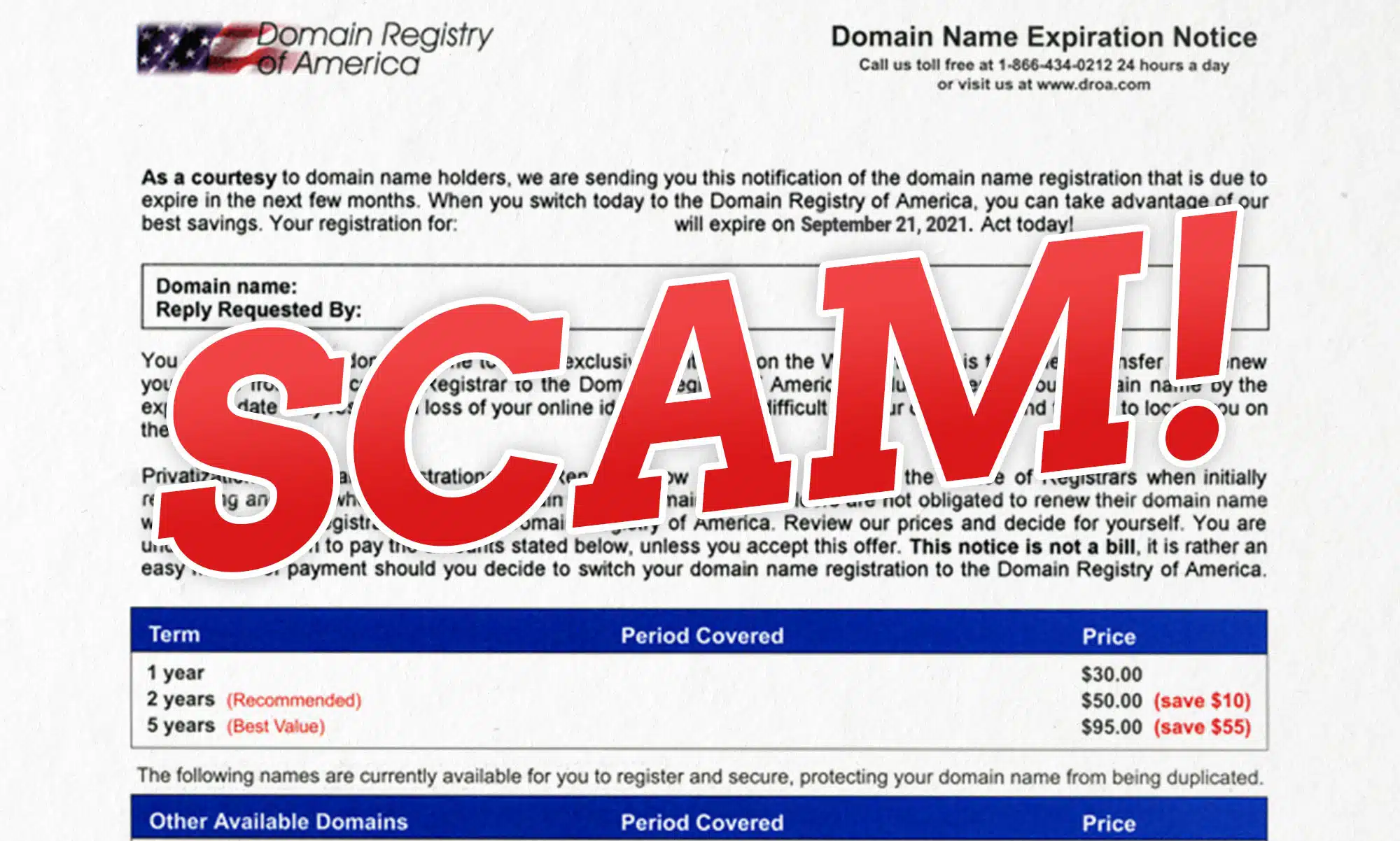Last updated: 18 October, 2025
Choosing a great business name for your brand comes with a catch: you also need a matching web address that will work for you. Domain name expert Joe Uddeme shares his tips for securing brand names that resonate – and for making sure your online presence is unbeatable, too.
Are you looking to buy business domain names for your startup? In this article, we’ll explore where to buy them, the steps to secure the ideal name, and why a good business name can make all the difference for a startup with big ambitions.
In many instances, the domain name for a startup business name you have settled on simply won’t be available. Or at least at face value, that appears to be the case.
However, dealing with a domain name broker can make a world of difference: a skilled broker can often snap up the name you need at a price that works for everyone. We’re here to make the impossible possible!
If you’re new to buying business names, why not check out our post about domain name valuations – or get in touch to find out how we can help.
Key Takeaways
- A strong business name enhances brand identity, recognition, and customer loyalty, playing a crucial role in a startup’s success.
- Legal protection through trademark registration safeguards a business name, preventing infringement and ensuring exclusive rights.
- Choosing a unique, memorable business name that reflects company values and accommodates future growth is vital for long-term success.
Why Buying a Business Name Matters
A strong business name is far more than just a moniker; it embodies the essence and values of your brand, influences customer engagement, and sets you apart from competitors.
It really does! Look at Tripadvisor or Etsy. Their names are unforgettable.
From establishing brand identity and recognition to offering legal protection and market differentiation, a thoughtful and strategic business name can be a game-changer.
Choose a business name for brand identity and recognition
A unique business name is a critical element of brand identity and recognition. It not only enhances visibility but also builds customer trust and loyalty. Think of your business name as a powerful marketing tool that attracts customers and differentiates you from competitors, directly influencing your brand’s trajectory.
Choose badly, and you’ll be forgotten. But a name that mirrors your brand’s identity aligns it with your products or services, boosting recall and recognition.
It acts as a branding blueprint, and should evolve with your vision.
Quite simply, investing in a business name is an investment in your brand! It also contributes to your future growth.
Some companies opt for names that connect to their founders or team members, adding a personal touch to their branding – think of Ben and Jerry’s. This personal connection can further enhance customer loyalty and brand integrity.
Legal protection and trademarking for your business name
Securing your business name legally is crucial to prevent others from using it – it provides legal protection and ensures you have exclusive rights. This legal ownership helps prevent potential infringement issue, and safeguards your brand’s integrity.
A trademark secures your business name, goods, and services nationwide or even globally, preventing others from using similar names in your industry. This reinforces recognition and reduces the risk of legal disputes and market confusion. You can apply online to register a brand name.
Register a business name that ensures market differentiation
In a crowded market, a distinct business name will help set your company apart from the competition. Choosing a unique business name can significantly enhance your brand recognition and ensure that your business stands out in the industry.
This isn’t a black and white rule: booking.com and hotels.com chose highly appropriate and generic names that define their industry. Others, however, have taken originality to the next level – think Reddit and Canva.
Distinct names make it easier for customers to recall your brand and differentiate it from others. This differentiation is particularly important for small businesses looking to carve out a niche in a competitive landscape.
Steps to Buy a Business Name
Before you begin: Purchasing a business name involves several important steps to ensure it aligns with your brand and legal requirements. From initial research and brainstorming to checking name availability to purchasing a premium domain name and registering it, each step needs your full attention.
Business naming checklist for startups:
- Initial research and brainstorming
- Checking name availability
- Purchasing a domain
- Registering the name
Let’s break down these steps to guide you through the process of buying and securing a business name.
Research and brainstorming
Research and brainstorming are the fun part – it’s a great way to get a feel for your fledgling brand and how you want to come across through your business name. Take your time, and gather feedback from friends and trusted business colleagues.
We recommend trying online tools like BrandRoot, which provides unique business name suggestions tailored to your preferences. These platforms can help generate ideas that are both creative and aligned with your brand’s identity. Remember, the goal is to create a name that resonates with your target audience and stands out in the market.
Checking brand name availability
Once you have a list of potential names, the next step is to check their availability. First type the name into Googler and see what results come up – if any,
Next, you need to check if your desired domain is already registered. The reality is that it probably is. But not always – if you’re a swimming pool company and think laterally (‘Splashify’ or ‘Dipily’, for example), you may get lucky.
Tools like GoDaddy or Namecheap make it easy to check domain availability.
If your name isn’t available, try again until something fits. Alternatively, consider working with an experienced domain broker who may be able to secure the exact name you want.
Confirm name availability in your state before registration, as each state has specific rules and requirements for business name registration. Remember, the domain name does not need to be the same as the legal business name, offering you some flexibility.
After a domain is registered, it is reserved for the entity that registered it. Other entities cannot use the domain until it becomes available again. This underscores the importance of securing your desired domain name as soon as possible to avoid any future complications.
Purchasing the Domain Name
Once availability is confirmed, purchase the domain name – probably with the intention of keeping it as long as you are in business. Choose a registrar with competitive pricing and reliable customer support for a better experience. Domain registrars provide a platform for users to purchase domain names, often bundled with hosting services.
The cost of a domain can range from $10 to $45 annually, influenced by various factors. Securing a domain name is crucial for establishing your business’s online presence, so consider this an essential investment in your brand’s future.
Registering Your Business Name
To legally begin your business, you must register your business name with the appropriate agencies. This process typically involves submitting paperwork to relevant state agencies, including details about your business structure. Entities such as LLCs, partnerships, and corporations are typically required to register their business names.
Additionally, businesses may need to acquire permits or licenses depending on their location and type of business. It’s crucial to designate a registered agent responsible for receiving legal documents when registering your business. Factors like your business location and structure may influence the registration process.
A trade name, or DBA (Doing Business As), lets you operate under a different name from your legal business name. Check with local government for filing requirements and fees. Regulations vary based on business structure and location, so verify to ensure compliance.
Where to Buy Business Names
There are several platforms and services where you can purchase business names. From online marketplaces to domain registrars and specialized business naming services, each option offers unique benefits.
Explore these options to find the perfect business name.
Online Marketplaces
Online marketplaces like BrandBucket and BrandRoot specialize in offering a variety of brand names for purchase. BrandBucket, for example, is an online marketplace with over 100,000 creative business names available. It provides curated names and smart search features, catering to lean, quick-to-market startups.
BrandRoot generates available business names ready for purchase, eliminating frustration. These platforms have no recurring fees and grant full rights to the domain name, making them convenient for new businesses.
Domain Registrars
Domain registrars are another viable option for purchasing a business name. When choosing a registrar, consider the price and customer service. If the name transfer fails, reputable registrars guarantee a full refund. The typical timeframe for completing a domain name transfer is 2-5 business days.
After you register your domain name, it is exclusively yours. No one else can utilize it while you maintain ownership. This exclusivity is crucial for maintaining your brand’s online presence and credibility.
Business Naming Services
Specialized business naming services offer tailored solutions to help startups create powerful brand identities. Utilizing these services can save time and provide expertise, ensuring businesses select memorable and impactful names. These services often employ professional naming experts who generate creative business names that resonate with target audiences.
In addition to naming, many of these services offer comprehensive branding packages that include logo creation and marketing strategies. This holistic approach ensures that your business name and brand identity are cohesive and compelling.
Evaluating the Cost of Business Names
Evaluating the cost of business names involves considering both initial and ongoing expenses. From the upfront costs of premium domains and registration fees to the recurring expenses of maintaining domain names and trademarks, budgeting effectively is crucial.
Let’s break down these costs to help you plan accordingly.
Initial Purchase Costs
The initial purchase costs of a business name can vary significantly. Premium domains, due to their popularity and memorability, can be substantially more expensive than standard domains. This perceived value and market demand can drive up the costs, making premium business names a significant upfront investment.
Additionally, the costs to register a business name can vary depending on the state and the type of business entity being formed. Together, these costs contribute to the overall financial commitment when establishing your business.
Planning for these initial expenses is essential for setting up a solid foundation for your brand’s online presence.
Ongoing Expenses
Maintaining a domain name requires annual renewal fees, which can vary based on the registrar and the type of domain. Renewal fees are often higher than the initial registration costs, so it’s important to budget for these ongoing expenses.
Besides initial registration, domain owners must consider renewal fees and potential transfer costs when changing registrars. Ongoing expenses related to a business name also include fees for maintaining trademarks, ensuring continuous legal protection for your brand.
Budgeting for Your Business Name
Budgeting for a business name should include initial costs, ongoing renewal fees, and additional services like privacy protection. Effective budgeting accounts for both initial and recurring expenses to avoid financial surprises.
It’s essential to account for potential additional fees, such as privacy protection and transfer costs, when budgeting for a business name. This comprehensive approach ensures that you are well-prepared for the financial commitments associated with maintaining your brand’s identity.
Legal Considerations When Buying a Business Name
Securing a business name legally helps prevent competitors from using a similar or identical name, thus protecting your brand. Understanding the legal implications related to trademark and copyright issues is crucial for avoiding potential disputes.
Let’s delve into the key legal considerations when buying a business name.
Conducting a Trademark Search
Conducting a trademark search is essential to avoid potential legal disputes and ensure brand protection. A trademark search can reveal if a business name is already in use or too similar to an existing trademark. To search for registered trademarks in the United States, you can access the USPTO’s tools.
The USPTO provides the TESS database, which is a tool specifically for conducting trademark searches. Before using a business name, check its availability against the official trademark database maintained by the USPTO to avoid legal issues.
Filing for Trademark Protection
The steps to trademark a business name include determining your need for a trademark, searching existing trademarks, preparing your application, and filing with the USPTO. A trademark application usually takes several months to process. In some cases, it may take over a year for approval.
Filing for trademark protection helps legally secure your business name and prevents others from using it without permission. This step is crucial for establishing long-term brand recognition and legal security.
Understanding Intellectual Property Laws
Understanding intellectual property laws is crucial for business owners, as it dictates trademark handling and protection. Most states require registration for a DBA (Doing Business As) name. Registering an entity name protects it at the state level.
Entity name registration prevents others from using the same name, with some exceptions based on state and business structure. Businesses outside the US should check local registration and trademark databases relevant to their country to ensure compliance.
Tips for Choosing the Perfect Business Name
Choosing a prospective business name is a strategic investment essential for future growth and market presence. Reflecting your brand’s values, ensuring memorability, and considering future growth are key factors.
Let’s explore some essential tips for making this critical decision.
Reflecting Your Brand’s Values
More businesses are selecting names that align with their values and mission. This trend also highlights their focus on societal impact. The name of a business serves as a representation of its core values and mission. A name aligned with your business’s purpose can enhance customer connection and loyalty.
Names that are catchy and easy to pronounce improve customer recall and word-of-mouth marketing. For example, names related to sustainability, like Renewables Co. or EcoImpact Solutions can attract customers who share similar values.
Ensuring Memorability and Uniqueness
A good business name must be memorable. It should also be easy to find. Aim for a unique name that differentiates you from others. It should help you stand out in the competitive landscape. Memorable names should be catchy, easy to remember, and roll off the tongue.
Avoid generic names that blend in with the crowd, as they reduce your brand’s visibility. Distinctive business names not only improve memory recall but also foster a stronger emotional connection with customers.
Considering Future Growth
Selecting a flexible business name can accommodate expansion into new markets or product lines. To ensure relevance to your target audience and business goals, it is essential to choose a name that aligns with your brand’s niche and industry.
Choosing a name that allows for future growth ensures that your brand remains relevant and adaptable as your business evolves. This foresight can significantly contribute to your long-term success.
Common Mistakes to Avoid When Buying a Business Name
When buying a business name, it’s easy to make mistakes that can have long-term consequences. From ignoring trademark issues to overlooking domain name availability and choosing trendy over timeless names, these common pitfalls can hinder your brand’s success.
Let’s explore these mistakes and how to avoid them.
Ignoring Trademark Issues
A thorough trademark search avoids legal conflicts and ensures your business name is unique. Trademark protection legally secures your name and prevents unauthorized use by the trademark office.
Understanding intellectual property laws is essential for business owners, as it dictates how trademarks are handled and protected. Ignoring these issues can lead to significant legal risks and potential conflicts over brand ownership.
Overlooking Domain Name Availability
Securing the matching domain name is critical to establishing a strong online presence for your business. Failure to secure the corresponding domain name can lead to customer confusion, resulting in lost traffic and revenue. Not having a consistent domain can erode customer trust, as consumers may question the legitimacy of your brand.
Ensuring domain name availability is a crucial step in maintaining brand consistency and credibility. This is something that turned out to be a sticking point for Tesla when they wanted to buy tesla.com – only to find that the name was taken by somebody else. While the official amount that exchanged hands was never publicly announced, it is thought to have been $11 million.
Choosing Trendy Over Timeless
Choosing a trendy name can lead to a rapid decline in relevance and customer attraction as trends change. Trendy names may not resonate with consumers in the long term, resulting in brand confusion and diminished loyalty.
Timeless names remain relevant and adaptable, allowing for better brand recognition and ongoing customer engagement. A business name built on timelessness fosters a stable brand identity that can evolve while maintaining core values.
Summary
Choosing the right business name is a critical step in your startup journey. From establishing brand identity and legal protection to ensuring market differentiation and planning for future growth, each aspect plays a vital role in your business’s success. By following the steps outlined in this guide and avoiding common pitfalls, you can secure a business name that resonates with your target audience and stands the test of time.
Remember, your business name is more than just a label; it’s an investment in your brand’s future. Take the time to choose wisely, and it will pay dividends in customer recognition, loyalty, and market presence. Here’s to your startup success!
Frequently Asked Questions about Startup Domain Names
Why is choosing a business name so important?
Choosing a business name is important because it embodies your brand’s essence and values, influences customer perceptions, and differentiates you from competitors. A well-chosen name can significantly impact your business’s success.
What are the steps to buying a business name?
To buy a business name, start by researching and brainstorming options, then check the name’s availability, purchase the corresponding domain, and finally, register the name with the relevant authorities. Following these steps ensures proper ownership and legal protection of your business identity.
How do I ensure my business name is legally protected?
To ensure your business name is legally protected, conduct a thorough trademark search and file for trademark protection with the USPTO. This will help safeguard your brand and prevent potential legal issues.
What are the costs involved in buying a business name?
When buying a business name, you should anticipate initial purchase costs for domain registration and potential trademarks, along with ongoing expenses like annual renewal fees. It’s essential to budget for both immediate and long-term financial commitments.
How can I avoid common mistakes when buying a business name?
To avoid common mistakes when buying a business name, ensure you conduct thorough trademark searches and check for domain name availability. Additionally, opt for timeless names rather than trendy ones to maintain relevance. To simplify and speed things up, consider hiring an experienced domain name brokerage company who can help you secure the startup business name you need.
About the author
Joe Uddeme is Director and Principal of NameExperts.com, one of the world’s leading domain name brokerage services. He has overseen domain name sales and acquisitions totaling more than $150 million and is renowned worldwide as a go-to expert in buying and selling premium domains. He has many years of experience in helping startups secure the right names for their business. Contact us at: [email protected]









